|
|
|
Sort Order |
|
|
|
Items / Page
|
|
|
|
|
|
|
| Srl | Item |
| 1 |
ID:
169300


|
|
|
|
|
| Summary/Abstract |
How does a nation geared to short-term politics achieve technological goals that stretch over decades? That is a cardinal question of U.S. space policy. The International Space Station (ISS) provides an important case study. Known originally as Space Station Freedom, it was initiated in 1984 by President Ronald Reagan to project U.S. leadership and compete with the Soviet Union’s space station program. NASA subsequently brought in Europe, Japan, and Canada as partners. The Clinton-Gore Administration reinvented “Freedom” as the International Space Station in 1993, enlisting Russia as NASA’s post-Cold War senior partner. ISS construction was completed in 2011 under President Barack Obama, who extended its utilization period until 2024. President Donald Trump has proposed ending funding in 2025 in favor of commercial take-over. This article uses a policy history of the space station for insights about how NASA Administrators advanced or impeded this long-term program. It employs the concept of “relay leadership” to show how a leader moved this program from one state of evolution, and another continued it to the next point. To accomplish any future long-term technological program, such as a Moon base or mission to Mars, NASA will need to apply policy lessons from the ISS experience.
|
|
|
|
|
|
|
|
|
|
|
|
|
|
|
|
| 2 |
ID:
169290


|
|
|
|
|
| Summary/Abstract |
On June 6, 2017, a draft bill entitled the American Space Commerce Free Enterprise Act was introduced to the US House of Representatives. Even though the bill has not been enacted into law yet, its relevance should not be underestimated. Indeed, it not only represents the latest step in regulating the nascent space mining industry but also contains several provisions that, to a large extent, challenges the traditional understanding of basic international space law rules. For example, the draft bill refers to the right of the US entities to engage in space undertaking without conditions or limitations, argues that not all the obligations of the Outer Space Treaty are imputable to those entities, and claims that outer space is not a global commons. In the light of the above, the purpose of the present viewpoint was to review the most innovative, yet controversial, elements of the draft bill and to assess their possible impact on future space resources utilization activities as well as on the overall stability of the space law regime
|
|
|
|
|
|
|
|
|
|
|
|
|
|
|
|
| 3 |
ID:
169312


|
|
|
|
|
| Summary/Abstract |
Space-based remote sensing is playing a prominent role for disaster management and socioeconomic development in Asia-Pacific. However, the unequal access to space technology in the region prompts the establishment of regional data-sharing agreements. This situation provides an opportunity for the region's leading space powers to enhance their regional influence. By invoking the concept of concept of Normative Power from the field of international relations, this article demonstrates (1) the applicability of this concept in the space sector, through an analysis of the European space sector and (2) the usefulness for decision-makers in advanced space powers to follow its methodological framework to design efficient strategies for enhanced regional influence. In particular, this paper argues that a tight collaboration with the Association of Southeast Asian Nations on space data sharing could participate in an ambitious Japanese diplomatic strategy of enhancement of its normative influence over the Asian space sector, in times marked by the rise of other powerful regional space actors.
|
|
|
|
|
|
|
|
|
|
|
|
|
|
|
|
| 4 |
ID:
169306


|
|
|
|
|
| Summary/Abstract |
This article deals with the possibilities and challenges of Japan's dual-use space situational awareness (SSA) systems. Japan is unique in a way that military use of outer space was completely prohibited for almost 40 years until the Basic Space Act (2008) became effective. The change in its space policy was decided because of the rapidly worsening security environment in East Asia, accompanied by preeminent threats to the safety, stability and sustainable use of outer space that constitutes a prerequisite for the safety and welfare of any country. This has led Japan to begin developing a full-scale SSA operation. However, Japan's long-standing non-military practice forces it to design and develop its SSA systems in a different manner than other advanced spacefaring nations. Given such conditions/restrictions, this article first identifies a Japanese means of constructing full-scale dual-use SSA systems, particularly taking into account the functions and capabilities of the Japan Aerospace Exploration Agency (JAXA), the significance of the Japan-U.S. Alliance and a series of recent governmental decisions. The merits and challenges of Japan's whole-of-government construction of the dual-use SSA will then be explored; this involves difficult processes to coordinate different defense and civil mission requirements. The conclusion envisions a balance between the Japan Air Self Defense Force's superior air defense capability and JAXA's accumulated technical capabilities, which together would enable full-fledged defense space utilization starting with the SSA.
|
|
|
|
|
|
|
|
|
|
|
|
|
|
|
|
| 5 |
ID:
169317
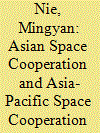

|
|
|
|
|
| Summary/Abstract |
The Belt and Road (B&R) initiative has been put forward by China as a comprehensive and multifaceted plan that also touches on the space industry. One significant project aimed by the B&R framework is to establish the B&R Space Information Corridor (B&R-SIC). The Asia-Pacific Space Cooperation Organization (APSCO), which was initially created by China as the platform to lead Asian space cooperation, has been recognized as a qualified participant of the B&R-SIC to co-build relevant programs and provide services. However, the existing legal mechanisms both internal and external to APSCO are insufficient to ensure the progress of its activities involving B&R space projects. It is necessary to explore a legal arrangement between APSCO and the responsible administrations of B&R space projects, at the same time of improving the legal framework of APSCO itself. More comprehensive implementation of the “fair return” principle could play an important role because it is helpful to generate a sustainable cooperation mechanism by equally respecting all member states' contributions. Also, a legal framework to accommodate increased commercial activities of APSCO will be beneficial.
|
|
|
|
|
|
|
|
|
|
|
|
|
|
|
|
| 6 |
ID:
169311
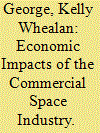

|
|
|
|
|
| Summary/Abstract |
The market structure of government investment domination in the space industry is being disrupted as commercial companies began working in the commercial space sector. As the 1960s was known as a government-funded space race, the 21st century may be known as a private interest space race. U.S. policy intended to speed innovation and drive costs down by expanding the role of commercial space companies. Hence, the 2018 orbiting sports car, yet more importantly, reusable rockets, satellites, and associated services developed as a result of the deliberate shift in government policy starting with the Commercial Space Launch Act of 1984.
|
|
|
|
|
|
|
|
|
|
|
|
|
|
|
|
| 7 |
ID:
169299
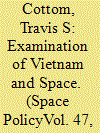

|
|
|
|
|
| Summary/Abstract |
Vietnam is slowly expanding its presence in space and to better understand where Vietnam is going in the future, a thorough examination that incorporates several factors must be completed. This article examines Vietnam's history in space, its space strategy, the organizational structure of its space program, how Vietnam is expanding its presence in space, and how Vietnam plans to use space for national security purposes. The article also reviews Vietnam's cooperation with other space nations where they are substantially benefiting from programs aimed at advancing the capabilities of emerging space nations. The article ends with potential areas that Vietnam and the United States can cooperate to advance both states capabilities in space while at the same time limiting Chinese influence in Vietnam.
|
|
|
|
|
|
|
|
|
|
|
|
|
|
|
|
| 8 |
ID:
169307


|
|
|
|
|
| Summary/Abstract |
Space exploration is a trailblazing project endowed with multiple uses by multiple users. The human settlement project on celestial bodies, such as the Moon Village, will give rise to complex activities. To regulate these activities, it is necessary to extend earthly countries' jurisdiction into outer space. This article examines existing rules on extraterritorial jurisdiction and identified possible problems thereof. This article offers solutions by making reference to the jurisprudences from human rights law. For the jurisdictional quasi-territorial jurisdiction and personal jurisdiction, this article offers new criteria in establishing them.
|
|
|
|
|
|
|
|
|
|
|
|
|
|
|
|
| 9 |
ID:
169305
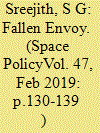

|
|
|
|
|
| Summary/Abstract |
This article revisits the legal status of astronauts by recounting the tale of their rise and fall in the International Space Law (ISL). ISL in its early years declared astronauts as envoys of mankind, although it later on entered into a state of forgetfulness of the term, replacing it with the more contemporaneous term “personnel.” Personnel brought a sense of everydayness and pragmatism to ISL as against the idealism attached to astronauts and to their status as the envoys of mankind's romantic collective. Spotlighting on this shift, this article argues that the term astronaut has, in fact, a semiotic effect in ISL that constantly evokes proud memories of human conquest of outer spaces. That is to say, in bestowing astronauts with the status of envoys of mankind, ISL mainly meant to record the remarkable feat of that day rather than actualizing astronauts in the deontological landscape of law. Later on, mindful of the burgeoning space activities and the need to regulate them, ISL espoused the term personnel to refer to space travelers. Today ISL governs the activities of personnel, whereas astronaut has a logocentric presence therein. Drawing on a relevant understanding of contemporary society and culture, the article concludes that astronauts have a legacy in law and society—they continue to exist as a cultural symbol in society and as a symbol of a culture in ISL.
|
|
|
|
|
|
|
|
|
|
|
|
|
|
|
|
| 10 |
ID:
169308


|
|
|
|
|
| Summary/Abstract |
Existing analyses of US-China relations in matters of space policy have overwhelmingly focused on the contemporary relationship, with a tendency to represent the interaction between the 2 states as primarily competitive for its entire existence. By making use of American archival materials, this article argues that these characterisations are misleading. Instead, the historical evidence shows that an iteration of a ‘Chinese space threat’ predates contemporary threat perceptions by almost 5 decades. Crucially, however, this first iteration of a ‘Chinese space threat’ was side-lined to such an extent in the 1970s that cooperation in space policy became possible, leading to some significant technology transfer. This cooperation lasted until the modern articulation of a ‘Chinese space threat’ began to make such exchanges controversial once again. Analysis of these archival materials, therefore, shows that, while contemporary tensions between the United States and China in outer space are not new, they are also not the norm.
|
|
|
|
|
|
|
|
|
|
|
|
|
|
|
|
| 11 |
ID:
169296
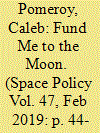

|
|
|
|
|
| Summary/Abstract |
The likes of Elon Musk and Jeff Bezos now occupy the headlines once dominated by Apollo and Soyuz. Described as New Space versus Old Space, debate surrounds the emerging commercial space industry and the role of nontraditional actors in the evolving contemporary space exploration environment. This article enters this debate by adopting a sociological approach to investigate the role of crowdfunding in financing space exploration today. We interviewed crowdfunded space project creators in disparate locations, from Moscow to Silicon Valley, who attracted capital ranging from $200 to over $1 million. We attempt to uncover their experiences using this distinctly social financing mechanism and find that although crowdfunding is unlikely to solve all of today's research funding conundrums, it does appear to increase access to space in unique ways. We argue, however, that the most interesting dynamic of this phenomenon is the way in which crowdfunding contributes to an increasingly democratic exploration environment and how this might impact space science research and the power structures of the space industry. This article concludes by considering possible implications of this trend and derives practical suggestions for both policymakers and individuals who may be considering the use of crowdfunding to finance space science research and exploration projects.
|
|
|
|
|
|
|
|
|
|
|
|
|
|
|
|
| 12 |
ID:
169295


|
|
|
| 13 |
ID:
169297
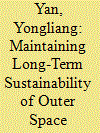

|
|
|
|
|
| Summary/Abstract |
This article provides a summary on the origins of the concept of the long-term sustainability of outer space activities (LTSOSA) by reviewing previous discussions related to the definition of this concept with the conclusion that the LTSOSA is in fact derived from the concept of sustainable development and comprises 5 legal elements, including the principles of intergenerational equity, sustainable use, intragenerational equity, integration, and peaceful purposes. In this regard, the LTSOSA to some extent has been already reflected in international environmental law and international space law. This article, therefore, argues that to enhance the LTSOSA, the Asia-Pacific Space Cooperation Organization (APSCO), which is a regional intergovernmental cooperative organization, has to embrace an LTSOSA regime because of its own interests, the need to fulfill its international obligations that have been imposed by international environmental law and international space law, and the need for regional efforts, which can complement both national and international efforts. Finally, it is concluded that the APSCO should establish internal legal regulations that address issues related to the LTSOSA, at least those that take into consideration space debris mitigation, space weather, space traffic management, capacity building (especially the transfer of space-oriented environmentally sound technology), and radio frequency interference.
|
|
|
|
|
|
|
|
|
|
|
|
|
|
|
|
| 14 |
ID:
169291
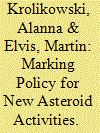

|
|
|
|
|
| Summary/Abstract |
Several national governments have recently taken substantial steps toward creating policies that apply to new, path-breaking activities at asteroids in outer space. Near-term activities on asteroids are likely to be various, including mining initiated by private firms and planetary defense activities pursued by public agencies. Current perspectives on making policy toward asteroid activities often presume that the different goals pursued by actors interested in asteroids are mutually supportive and that diverse actors’ common focus on asteroids builds momentum for creating an enabling policy environment. In contrast, we argue that the 4 main categories of asteroid activities envisioned today—scientific research (science), human settlement of other parts of the solar system (settlement), planetary defense (security), and mining (sales)—are best served by policy regimes with distinct features. Different activities require different policy arrangements, which are not straightforwardly compatible. The incompatibilities present policymakers with trade-offs. This article discusses the 4 main types of asteroid activities and their related policy needs to highlight these trade-offs and influence debate.
|
|
|
|
|
|
|
|
|
|
|
|
|
|
|
|
| 15 |
ID:
169310


|
|
|
|
|
| Summary/Abstract |
Pakistan was among the first 10 countries to start a space programme. Its space programme started upon the appointment of Dr. Abdus Salam (Noble Prize Winner) as the Chairman of the Space Upper Atmosphere Research Commission (SUPARCO) in 1961. Owing to the prevailing unfavourable economic and political environment, coupled with regional instability and other factors, this programme could not persist for long. Recent efforts to overcome these mistakes and hurdles through an improved domestic strategy and smarter international relations are promising. Notably, success in this area can be ensured only with sustained political commitment to space development. To promote its space activities, Pakistan successfully conducted international cooperation with different countries and organisations. This article examines the Pakistan space programme and its cooperation with other countries, in particular, the shift in partnership from the United States to China.
|
|
|
|
|
|
|
|
|
|
|
|
|
|
|
|
| 16 |
ID:
169315


|
|
|
|
|
| Summary/Abstract |
This article reviews South Korea's response model for space object impacts, re-entries, and collisions. These are countermeasure models that are prepared for natural or artificial space objects falling in South Korea or colliding in space, and they employ the Ministry of Science and ICT (MSIT) to perform 4 stages that include prevention, preparation, response, and restoration. However, the article suggests that this process is inefficient given that the MSIT specializes in research and development but is expected to perform disaster response tasks in the event of natural or manmade space object impacts and re-entries. The research presents 2 alternative models to the current ones: the first model specifies that the MSIT and the Ministry of the Interior and Safety (MOIS) work together, and the second model designates the MOIS as the only agency responsible for the disaster response. These alternative models would more effectively handle disaster management than would the current models.
|
|
|
|
|
|
|
|
|
|
|
|
|
|
|
|
| 17 |
ID:
169293


|
|
|
|
|
| Summary/Abstract |
The Outer Space Treaty (OST), which entered into force on 10th October 1967, has served as a foundation of international space law since the second decade of the Space Age. To mark the 50th anniversary of the Treaty's entry into force, a special panel event was organized during the 68th International Astronautical Congress held in Adelaide, Australia, from 25th–29th September 2017. The authors of this viewpoint were invited to share their perspectives on the governance framework for outer space activities underpinned by the OST and to reflect on the prospects for the future of global space governance, and the opportunities presented by UNISPACE+50, which will mark the 50th anniversary of the first UNISPACE conference in June 2018. This viewpoint begins with a retrospective reflection of 3 panellists on the contributions of the OST to global space governance in the past 50 years and the challenges facing the OST at present. The fourth reflection focuses on the potentials of UNISPACE+50 in 2018 to strengthen global cooperative space governance for the next 50 years of the space age.
|
|
|
|
|
|
|
|
|
|
|
|
|
|
|
|
| 18 |
ID:
169309
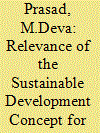

|
|
|
|
|
| Summary/Abstract |
This article provides an analysis of the concept of sustainable development in the context of current international space law. The extent of doctrinal conflicts and consensus of the international space law conventions and instruments with the concept of sustainable development could be well understood from this analysis. The result clearly indicates that there is consonance between the legal concept of sustainable development and international space law framework. At the same time, the article points out that the various issues relating to the long-term sustainable use of outer space and concerns faced because of a gap in international space law still exist. To curb this problem, it is important to improve the normative nature of international space law. The analysis helps in highlighting that incorporating the legal concept of sustainable development in a proactive manner into international space law would help in increasing the normative character as well as increasing its effectiveness.
|
|
|
|
|
|
|
|
|
|
|
|
|
|
|
|
| 19 |
ID:
169313
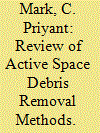

|
|
|
|
|
| Summary/Abstract |
This article gives an overview of the active space debris removal methods that are currently in development. Orbital debris removal has become a very critical part of the commercial and scientific space management. It is an aggregating risk which needs to be immediately addressed to prevent loss of spacecraft to debris collision. The various concepts and methods which tend to bring the accumulating risk to a halt have been classified and reviewed. They are classified into collective, laser-based, ion-beam shepherd-based, tether-based, sail-based, satellite-based, unconventional, and dynamical systems-based methods. The dynamical systems-based method is a contemporary concept, which is developing at a rapid pace. Recent trends were analyzed to ascertain the evolution of the active space debris removal programs. State-of-the-art methods are essentially required to address the various sizes of space debris that need to be removed. This brings a huge opportunity in the area, which includes discovering commercially viable options, cleaning orbital regions, and optimizing crowded satellite orbits.
|
|
|
|
|
|
|
|
|
|
|
|
|
|
|
|
| 20 |
ID:
169304
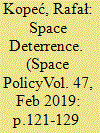

|
|
|
|
|
| Summary/Abstract |
The development of the antisatellite (ASAT) weapons is a crucial process of the second era of space militarization. As a result, outer space loses the status of a sanctuary. However, this process does not steam only from the technological advance but also from strategic circumstances. The increasing number of space actors makes the system less stable. The degree of dependency on space assets is significantly different in different countries, what creates the vulnerability gap. What is more, the capability to defend a space infrastructure is profoundly limited due to physical and technological limitations, favoring offensive actions. Outer space is turning into offense-dominant domain.
|
|
|
|
|
|
|
|
|
|
|
|
|
|
|
|
|
|
|
|
|